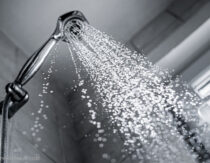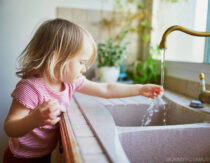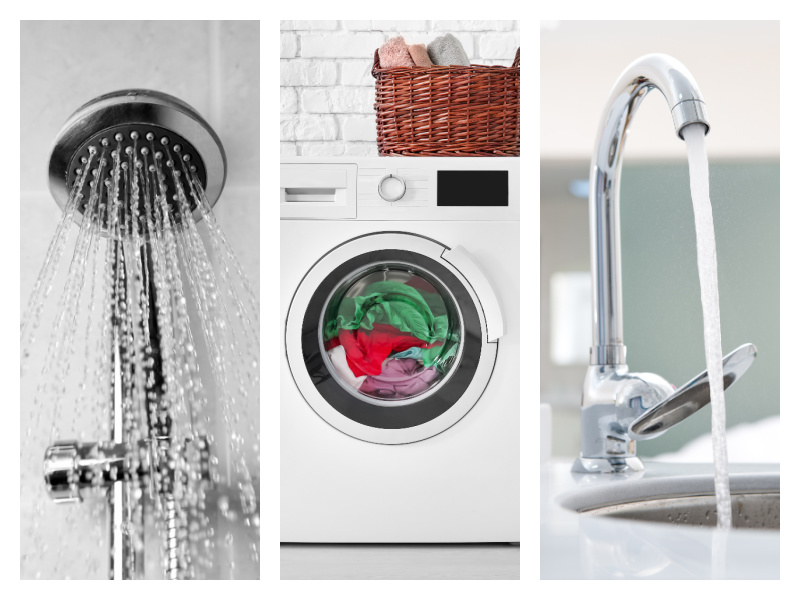
When it comes to filtering the water we shower, bathe, and brush our teeth with, whole house water filters offer a simple, low-maintenance solution. Of course, with all the options available, deciding on which one to go with is not so simple.
We’ve already covered common harmful contaminants in tap water – including ones that tend to be inhaled or absorbed through skin when showering or bathing – so in this article I’m going to dive right into the pros and cons of going with a whole house water filtration system. I’ve also included my top recommendations.
- Pros of Whole House Water Filters
- Cons of Whole House Water Filters
- What is the optimal flow rate?
- Why Microbe Resistant Materials Matter
- Filtration Technology
- ProHome Plus by ProOne (formerly ProPur)
- ProHome Complete by ProOne (formerly ProPur)
- Pelican Carbon Series Whole House Water Filter (By Pentair)
- Aquasana OptimH2O
- Other Whole House Filters I Considered
Pros of Whole House Water Filters ^
They filter all the water that comes into the home, including the water we shower, bathe and brush our teeth.
Long-term, the price-per-gallon of filtering the water is generally lower than the cost of installing point-of-use systems for all showers and sinks
Many systems have water softener or chemical-free water conditioning options available, which may extend the lifespan of plumbing and appliances that use water
Cons of Whole House Water Filters ^
Initial Cost – Although they tend to save money in the long-run, whole house systems do require an upfront investment.
May Reduce Flow Rate (Depending On The Model) – Because all the water that comes into the home has to pass through the filter, the speed at which the water can pass through determines how much water you can use at any given time.
The number of gallons of water per minute (GPM) a filter can produce is called its flow rate. If the flow rate is too low (based on the square footage of your home and number of people using water), it can cause a noticeable drop in water availability.
Installation – Unlike countertop or even under counter systems which are fairly easy to set up, whole house systems often require a fair amount of DIY skill or professional installation.
What is the optimal flow rate? ^
Two main factors influence how many gallons per minute a home needs to function normally:
- The number of people in the home (1-4 people is considered a small household, 5+ people is considered a large household)
- The square footage of the home
- How many appliances/faucets/shower heads are likely to be often used simultaneously (For example, do you almost always have a load of laundry and dishes running when someone hops in the shower?)
If the GPM is too low to meet demands, users may experience a decrease in water flow. Unfortunately, there isn’t a consensus on what the optimal GPM should be.
7 GPM will probably work for most small families (1-4 people) with 1-2.5 bathrooms. For small families with 2.5 or bathrooms and/or who consider themselves a little higher on the usage scale (lots of dishes/laundry + frequent showers, etc) 10 GPM might be a little more comfortable.
My family is considered large (5 people) and because we cook three meals from scratch every day we always have dishes (and laundry) going. For families like us, a minimum of 12-15 GPM may be a better fit.
Why Microbe Resistant Materials Matter ^
Most whole house filters use activated carbon because it’s so effective at binding with a variety of contaminants. However, what’s not as well-known is that it can serve as a growth-medium for bacteria. (1)
That’s why when it’s used in water filters – especially ones that are changed infrequently like whole house filter cartridges – it needs to be paired with bacteriostatic (bacteria inhibiting) materials.
I was able to confirm that all the filters I recommend include bacteriostatic materials with one exception: the Aquasana OptimH20 filters are replaced frequently enough (1 year vs up to 10 years) that colonization is not a concern.
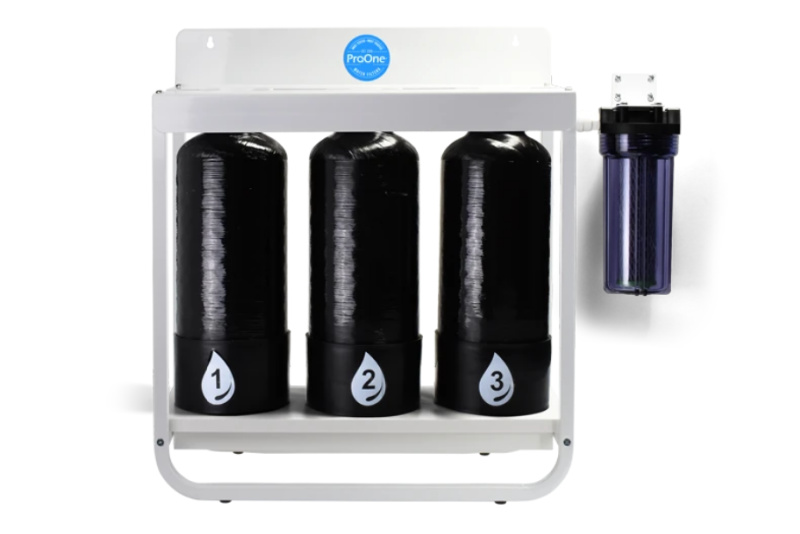
ProHome Standard by ProOne (formerly ProPur)
Price: $1,799.00
The ProHome standard removes/reduces 220+ contaminants including fluoride, heavy metals, VOCs and chromium 6. In fact, of all the product specialists I spoke with, only the ProOne specialist felt their whole house system removes contaminants thoroughly enough that an additional under sink/countertop filter is not necessary for further filtering drinking water.
At 7 GPM, the flow rate of their system is better for smaller homes up to 2 bathrooms. For homes with 2.5+ bathrooms, it may be necessary to install two systems in parallel. A c-manifold is used like a splitter so that each system handles half the water that comes into the home, which significantly increases the overall GPM.
Filtration Technology ^
The Filtration System includes:
3 Stage Filtration – Tanks 1 and 2 use granular activated carbon mixed with 1 inch cubes of their their proprietary ProMax filtration media. Unlike most filters, which use popular materials such as catalytic carbon, activated carbon and KDF media, there’s not a lot of information available about ProMax technology.
Given that this filter is certified to reduce/remove a very broad range of contaminants including difficult ones like chromium 6, I can understand why they’d want to keep their formula under wraps. At the same time, I do hope they’ll share more about it in the future. They did confirm that it does not contain activated alumina which is important to me.
ElectroCharged Post Filter – The final stage of this filter system uses an ElectroCharged™ Pleated Sub-Micron Water Filter Cartridge to “adsorb a wide range of submicron particulates for improved filter efficiency and flow rate compared with the mechanical pores process. The silver infused pleated media of this filter cartridge helps prevent the growth of bacteria.”
Optional Addition: Salt-Free Water Softener
This filter can be used with well water as long as water hardness is below 11 grains. Moderate hard water (municipal or well) can be softened with their salt-free water conditioner.
Pros
- Removes/reduces 220+ contaminants including fluoride and chromium 6 (no add-on filter needed)
- Tested by a certified independent lab to NSF/ANSI Standards 42, 53, 401 and P473
- Comes with bacteriostatic materials to inhibit bacterial growth
- Tanks 1 and 2 can filter contaminants for up to 50,000 gallons and tank 3 can filter chlorine for up to 100,000 gallons
- Filter materials are easy to replace
- Includes a scale inhibitor to help protect your water-using appliances from the damaging effects of limescale build-up”
Cons
- Professional installation required
- 7 GPM flow rate may not be enough for larger families or homes. GPM can be improved with a parallel system, but that doubles the cost of the system.
- Higher than average replacement filter cost
My Take On The ProHome By ProOne
The ProHome Standard is definitely a stand-out in terms of contaminant removal. I’d love to know more about what is in their filtration media, but I understand their desired to keep things proprietary.
Unfortunately, the ProHome is sold out right now due to worldwide supply chain issues. However, I have reached out to the company and asked them to let me know as soon as it’s available.
If you’d like me to email you when it’s back, fill out the form below and I’ll send you a quick update when I have one. I won’t email you about anything else, promise.
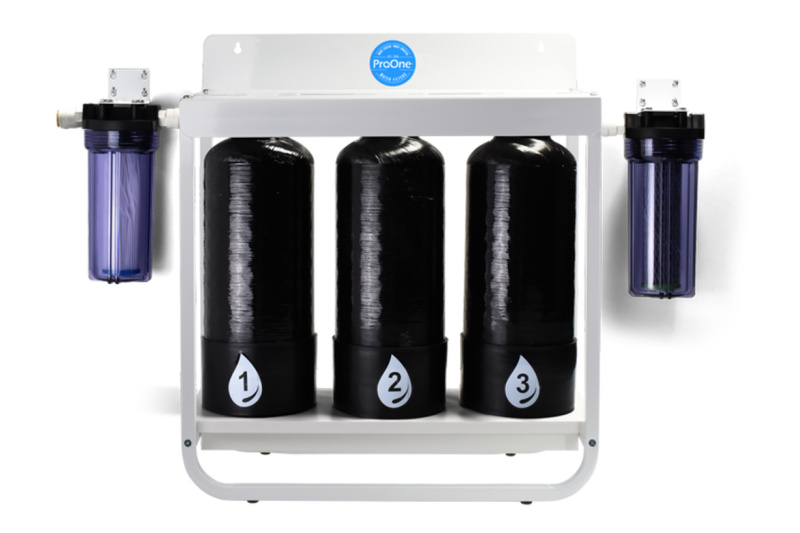
ProHome Plus by ProOne (formerly ProPur) ^
Price: $1,878.95
The ProHome Plus includes all the benefits of the ProHome standard, but also comes with a pre-sediment filter that helps to remove heavy sediment and particulates including dirt, rust, sand, silt, and debris.
Unfortunately, the ProHome Plus is sold out right now due to worldwide supply chain issues. However, I have reached out to the company and asked them to let me know as soon as it’s available.
If you’d like me to email you when it’s back, fill out the form below and I’ll send you a quick update when I have one. I won’t email you about anything else, promise.
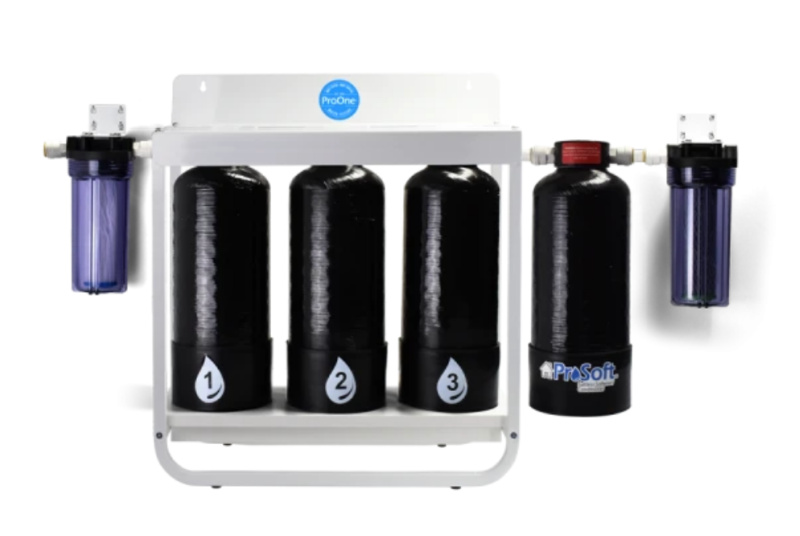
ProHome Complete by ProOne (formerly ProPur) ^
Price: $2,778.90
The ProHome Complete has all the same benefits as the ProHome Standard but it also includes the pre-sediment filter and a water softener/ conditioner.
Unfortunately, the ProHome Complete is sold out right now due to worldwide supply chain issues. However, I have reached out to the company and asked them to let me know as soon as it’s available.
If you’d like me to email you when it’s back, fill out the form below and I’ll send you a quick update when I have one. I won’t email you about anything else, promise.
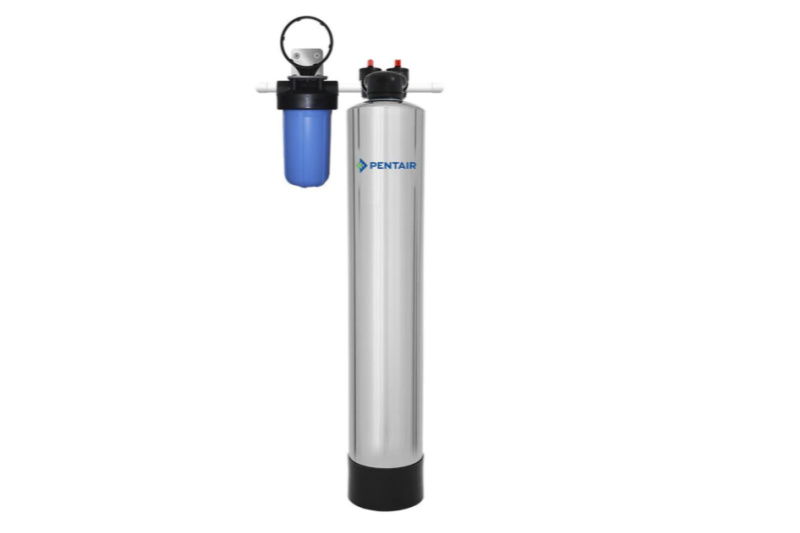
Pelican Carbon Series Whole House Water Filter (By Pentair) ^
Price Range: $903.76 – $2,091.6
The Pelican Carbon Series whole house water filter “addresses more chemicals than most whole-house filters,” according to the company, which is very well-respected as both a manufacturer and innovator of filtration systems.
It can be customized in a few different ways:
If you have well water or city water that frequently issues boil notices due to microbial contamination, you can add a UV filter that kills 99.9% of all bacteria and viruses.
If you need fluoride filtration, you can add an additional filter for $1660. The carbon filters in the basic home system actually improve the performance of the home fluoride filter, so Pelican often recommends that both be used together.
If you want to counteract hard water buildup, you can add on a traditional salt-based water softener system or a salt-free water conditioner made with calcium carbonate technology that they invented. (Cost varies based on what you go with).
It is also customized based on the number of bathrooms in your home. This ensures that the system is the right size needed to optimized flow rate.
So what exactly does it remove? The whole house filter is certified by IAPMO Research & Testing to meet NSF/ANSI standards 42 (which primarily deals with the reduction of chlorine and chloramine) and 61 (which covers the safety of the components used in the filter).
It’s not rated for NSF/ANSI standard 53, which covers contaminants known to have negative health effects.
Although they aren’t rated for standard 53, which specifically deals with contaminants known to have negative health effect, they do say their are designed to remove a lot of contaminants in that category including “pesticides, herbicides, pharmaceuticals, industrial solvents and hundreds of other contaminants that may be present in your water.” (2)
Filtration Technology
The basic model includes a 4-Stage Filtration System:
Stage 1: 5-Micron Pre-filter System – The sediment pre-filter system reduces sand, silt, sediment and debris in the supplied water down to 5 micron (20 times smaller than a human hair) in size. With average use it needs to be replaced approximately every 6-9 months.
Stages 2 & 3: Catalytic Granular Activated Carbon Media (GAC) – These stages use a high-grade mesh blend of catalytic coconut shell carbon that is “designed to filter chlorine, chloramines, pesticides, herbicides, pharmaceuticals, industrial solvents and hundreds of other contaminants that may be present in your water.”
The filters use upflow technology that increases contact time with the carbon media for optimal filtration.
Stage 4: Copper and Zinc Oxidation Media (KDF-55) – This is a patented copper-zinc reduction oxidation media that is included for the purpose of removing chlorine.
Pros
- Certified by IAPMO Research & Testing to NSF/ANSI standards 42 (aesthetic, non-health-related contaminants) and 61 (covers the safety of the components used in the filter)
- Guaranteed to reduce chlorine and chloramine below minimum detection levels (MDL) for 5 years or 650,885 gallons (the larger system can handle 1,301,770 gallons)
- Uses materials also designed to filter “pesticides, herbicides, pharmaceuticals, industrial solvents and hundreds of other contaminants that may be present in your water”
- Excellent flow rate of 12-15 GPM (gallons per minute) depending on the number of bathrooms it is designed to handle
- Can reduce fluoride with add-on filter
- More thorough at removing chloramine from bathing/shower water than point-of-use shower filters
- Comes with bacteriostatic materials to inhibit bacterial growth
- Filter life is 600,000-1,000,000-gal. /5-year capacity
- Relatively low filter replacement cost
- Comes with 5 year performance guarantee
- Filter materials are easy to replace – no special plumbing skills required
- Can be DIY installed if desired (does not require professional installation to validate warranty)
Cons
- Doesn’t provide full list of contaminants removed (see section below for my thoughts on this)
- Basic system does not filter fluoride (but it can be added on)
- Does not include an indicator of when the sediment filter needs to be changed
- Depending on your DIY skills, it may be necessary to hire a plumber to install
My Take On The Pelican Whole House Filter
After researching water filtration for over a year, I’ve come to think of certain companies as having personalities. If I had to describe Pelican’s, it would be “under promise and over deliver.”
Their whole house filters offer the highest flow rate of all the options I considered, which basically means that a family can go about daily life (running the dishwasher, showering, and washing clothes at the same time, for example) without noticing a drop in water pressure.
They don’t publish a list of contaminants reduced by a certain percentage, but they do say that their filtration materials “are designed to filter chlorine, chloramines, pesticides, herbicides, pharmaceuticals, industrial solvents and hundreds of other contaminants that may be present in your water.”
Other companies do publish a list with percentages that can be achieved under certain conditions, which may not be the same conditions in our homes but can give us a sense of what the filter is best at. Both are valid approaches.
The Pelican whole house filter is a solid system made by one of the most respected manufacturers in the industry. Long-term, it filters more water at a lower price point than using point-of-use filters to remove contaminants from showers, baths, the water we use to brush our teeth with, etc.
However, it’s not able to filter Chromium 6 (a chemical of emerging concern that you can read about here) and some other contaminants, so even though it’s a great option for filtering shower/bath/bathroom faucet water I would still take additional steps to filter drinking water with a countertop or under counter system.
If you have a well system, they have a variety of different filtrations options that can be customized to address what testing shows is in your water.
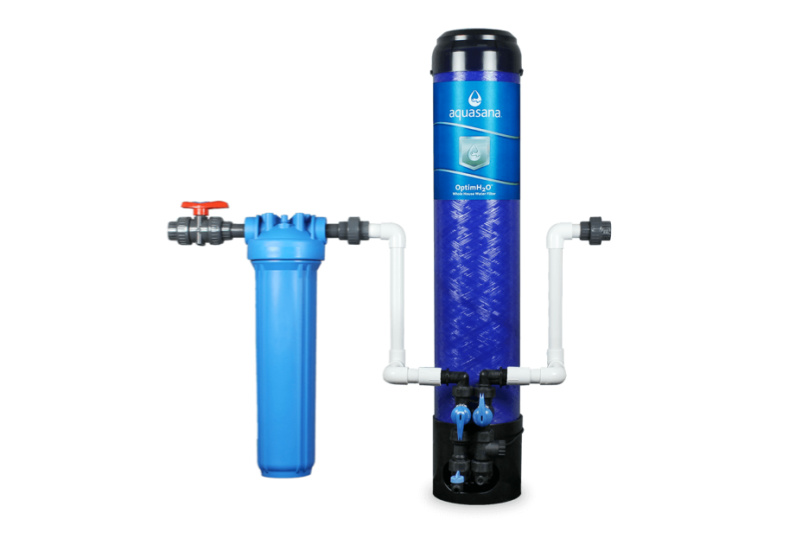
Aquasana OptimH2O ^
Price: $1799
The OptimH20 is IAPMO tested and certified to NSF/ANSI Standard 53, which covers contaminants known to have negative health effects. Under optimal conditions, the system also reduces more than 99% of lead and cysts, 98% of PFOA/PFOS, plus chlorine, chloramines, and more.
It does not filter fluoride and cannot accommodate an add-on filter to do that, so if fluoride reduction is a priority for you, another system may be a better option.
The basic filter can be customized in a couple of different ways:
If you have city water that frequently issues boil notices due to microbial contamination, you can add a UV filter that kills 99.99% of viruses, bacteria, and chlorine resistant cysts for an additional cost of around $580. The UV filter is included in their well water filter, which I’ll review below.
If you want to counteract hard water buildup, you can add on a salt-free water conditioner to naturally and safely reduce scale buildup on internal pipes and plumbing for an additional cost of around $670.
Filtration Technology
The OptimH20 uses a single, ultra-dense carbon block with its “own unique formula of high-potency, contaminant-grabbing media and filtration” that includes both catalytic and activated carbon.
Pros
- Certified to NSF/ANSI Standard 53 – reduces chlorine and chloramine up to 90% plus 99% of lead and cysts, 98% of PFOA/PFOS, and more
- The system monitors water and flow rate and gives you a color-coded notification when it’s time to replace your filter
- Replacing filters is easy
Cons
- Does not filter fluoride
- Installation requires tools and skills that are probably outside the average DIYers’ scope
- 7 GPM flow rate may not be enough for some families, but for an additional investment there is a dual manifold installation option that can increase GPM
- Some reviews noted a drop in water pressure after installation, but the company says this was due to a post-filter issue that has been corrected
My Take on Aquasana
The OptimH20 is best suited for families who don’t have fluoride added to their water and/or are using well water that does not contain naturally occurring fluoride.
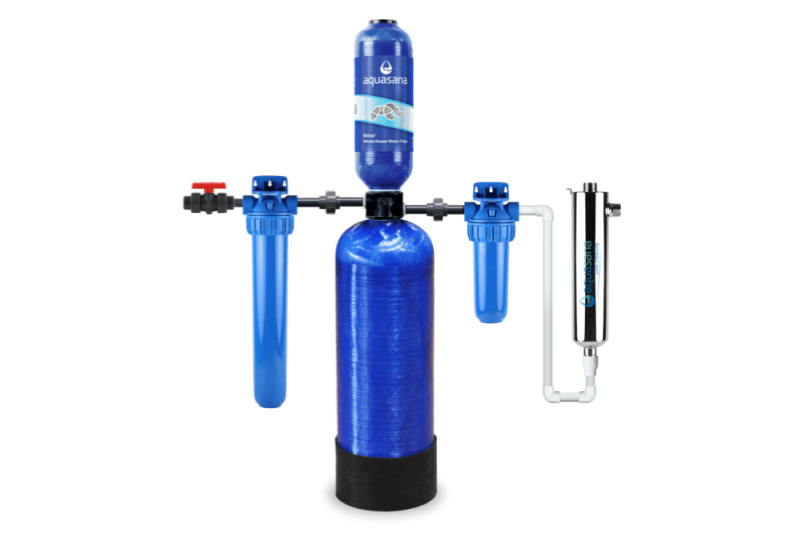
Aquasana Rhino Well Water with UV
Price: $1249
Because the contaminants found in well water are typically different from those found in municipal water, Aquasana has created a system specifically designed to target those concerns. It uses a slightly different form of carbon (catalytic instead of activated) along with a UV filter that kills 99.99% of viruses, bacteria, and chlorine resistant cysts.
Like the OptimH20, it also comes with the option to add a salt-free water conditioner to naturally and safely reduce scale buildup if needed.
Filtration Technology
The Aquasana Rhino Well Water with UV filtration uses activated carbon, catalytic carbon, and KDF 85 media with a dual tank design that increases water contact time for optimal contaminant reduction. As the name of the filter implies, it also incorporates a UV filter to address microorganisms.
Pros
- Third-party tested for the reduction of bacteria, viruses, and other contaminants commonly found in well water
- Includes bacteriostatic media that prohibits bacteria and algae from growing inside the system
- Relatively easy installation
- Replacing filters is easy
Cons
- 7 GPM flow rate may not be enough for some families, but for an additional investment there is a dual manifold installation option that can increase GPM
My Take On The Aquasana Rhino Well Water With UV
If you’re on well water, the Aquasana Rhino Well Water filter is a solid system well worth considering.
Other Whole House Filters I Considered ^
Any time I publish a review of several products at once, I get asked if I’ve considered a brand that is not mentioned. Below are some that I did look into. If you think there’s another one I should please let me know in the comments!
SpringWell makes whole house filters that are designed for both municipal and well water. While they do use NSF certified components – which basically means that that the materials used to make the components won’t leach toxins into the water – I couldn’t find any independent certifications that verify the performance of their systems.
The Aqua-Pure Whole House system is affordable and certified to meet NSF/ANSI standard 42 for chlorine removal, but other than that the only other thing it seems to do well is remove sediment. It doesn’t remove heavy metals, pharmaceuticals, chloramine, and other contaminants.
Want a FREE ebook of non-toxic cleaning recipes that WORK?
I’ve created a free ebook for you as a gift for signing up for my newsletter. 7 Non-Toxic Cleaning Recipes That Really Work covers seven recipes that you can make in just a few minutes each for squeaky clean windows, sparkling dinnerware, lemon-fresh countertops, and more. Subscribe to my newsletter below and you’ll be redirected to a download page for immediate access to this PDF ebook.
1. Wu, Chia-Chen et. al. (2017) The microbial colonization of activated carbon block point-of-use (PoU) filters with and without chlorinated phenol disinfection by-products
2. National Sanitation Foundation. NSF Standards for Water Treatment Systems

